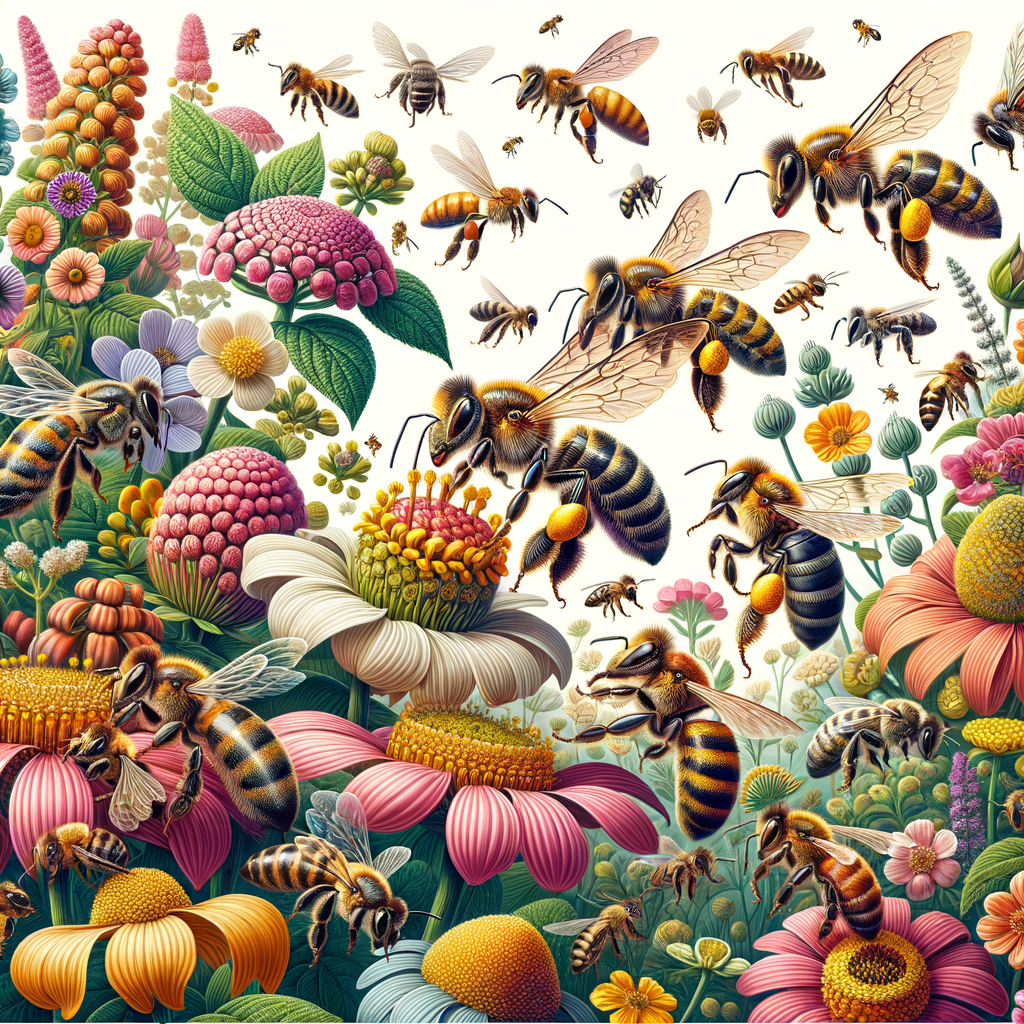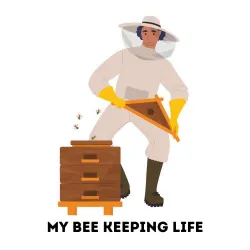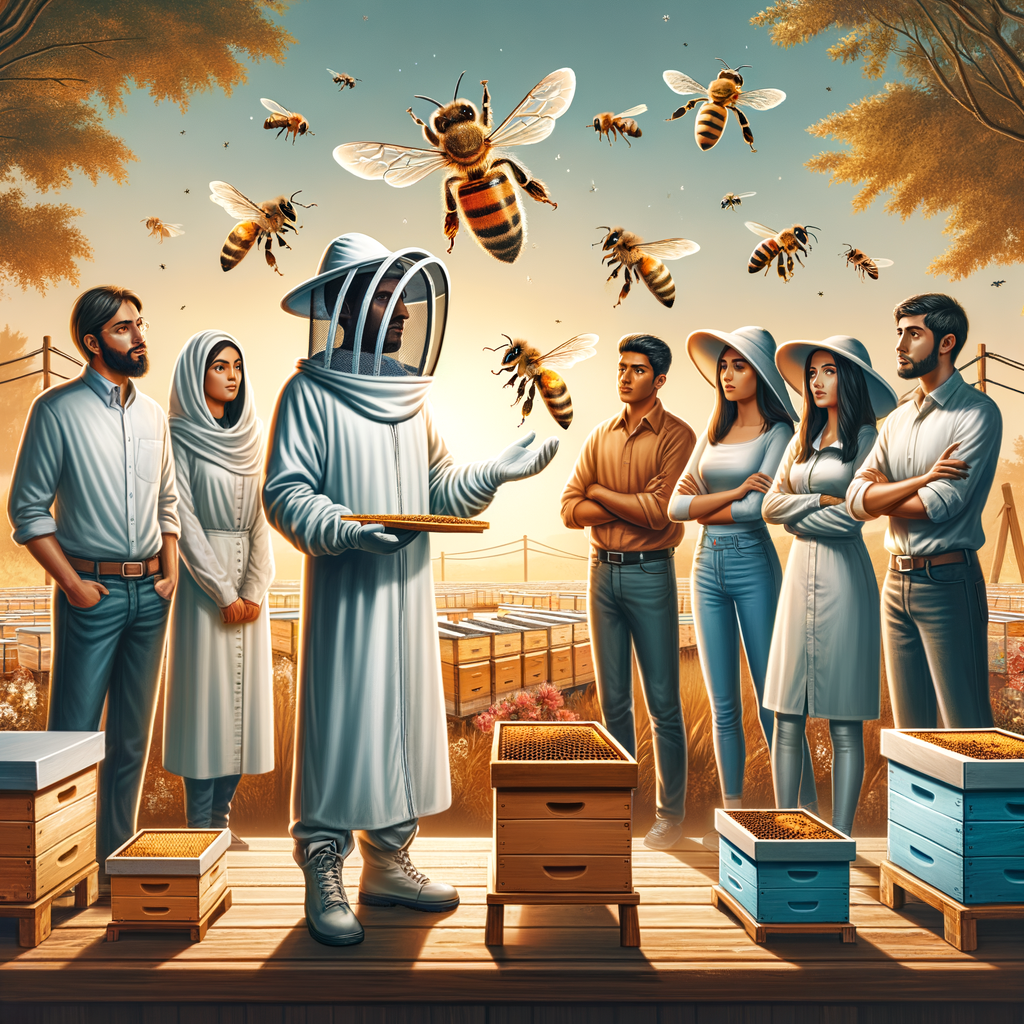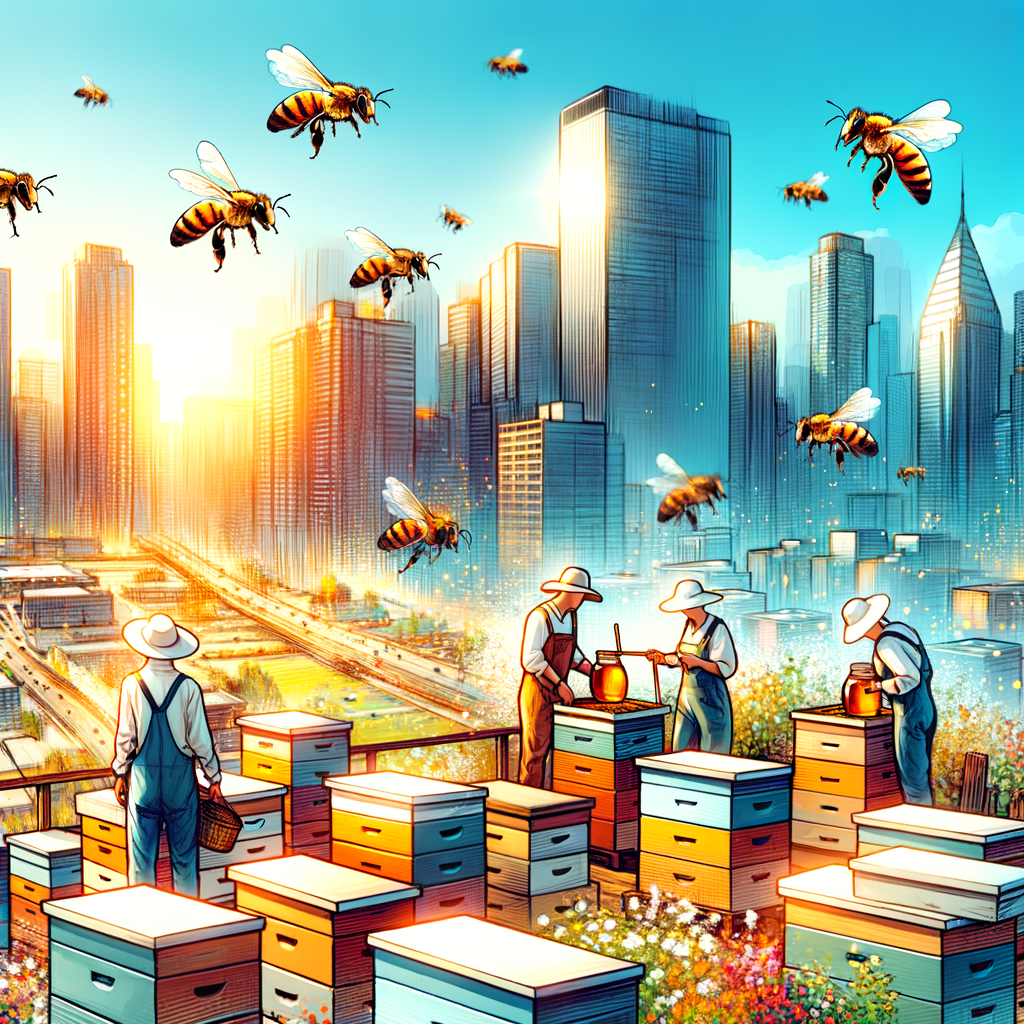
Introduction to the Importance of Bees in Ecosystems
Bees are small insects that play a big role in our world. They are often seen buzzing around flowers, but their work goes far beyond that. Let’s take a closer look at the importance of bees in ecosystems.
-
- Overview of the role of bees in ecosystems
Bees are known as pollinators. This means they help plants to reproduce by carrying pollen from one flower to another. Without bees, many plants would not be able to produce fruits, vegetables, and seeds. In fact, about one-third of the food we eat depends on bees and other pollinators. That’s a big job for such tiny creatures!
-
- Importance of bees in maintaining biodiversity
Biodiversity is the variety of life in an ecosystem. Bees contribute to biodiversity by pollinating a wide range of plants. This helps to create a balanced and diverse ecosystem. When bees pollinate plants, they help to produce fruits and seeds that feed other wildlife. This makes bees important for not just plants, but for animals too.
-
- Impact of bees on environmental sustainability
Bees also play a role in environmental sustainability. They help to keep our planet healthy by supporting growth of trees, flowers, and other plants, which provide habitat for other creatures, produce oxygen, and absorb carbon dioxide. Without bees, our environment would look very different.
Bees are vital to the health of our ecosystems. They help to pollinate plants, maintain biodiversity, and support environmental sustainability. So next time you see a bee buzzing around, remember the important work they are doing!
Understanding the Bee Ecosystem Role
In our quest to understand the role of bees in the ecosystem, one of the most significant aspects we need to explore is pollination. Let’s delve into this process and the crucial role bees play in it.
Pollination by Bees
Pollination is a fascinating process, and bees are one of the main actors in this natural drama. Let’s break it down into three key points:
-
- Explanation of the Process of Pollination
Pollination is the process by which pollen is transferred from the male parts of a flower (the stamen) to the female part (the pistil). This transfer leads to the fertilization of the plant’s seeds. It’s like a plant’s way of having babies!
-
- Role of Bees in Pollination
Bees are like nature’s delivery service. When a bee lands on a flower to collect nectar, pollen grains from the stamen stick to the bee’s body. When the bee visits the next flower, some of this pollen rubs off onto the pistil. This is how bees help plants to reproduce.
-
- Impact of Pollination on Plant Reproduction
Without pollination, plants wouldn’t be able to reproduce, and we wouldn’t have many of the fruits, vegetables, and nuts we eat every day. In fact, about 75% of the world’s flowering plants and about 35% of the world’s food crops depend on animal pollinators like bees to reproduce. That’s a big job for such small creatures!
So, as you can see, bees play a vital role in the ecosystem by helping plants reproduce. This not only keeps our environment healthy and diverse but also puts food on our tables. Next time you see a bee buzzing around a flower, remember the important work it’s doing!
Bees and Biodiversity
Bees play a significant role in maintaining biodiversity on our planet. Let’s explore how they contribute to biodiversity and some examples of ecosystems that they support.
-
- How bees contribute to biodiversity
Bees are known as ‘keystone species’, which means they have a big job in the world of biodiversity. They are one of the main pollinators in nature, helping plants to reproduce. When bees carry pollen from one plant to another, they help create new plant life. This new plant life becomes a part of the ecosystem, providing food and habitat for other creatures. This cycle of pollination and plant growth maintains the diversity of plant species and contributes to a healthy and balanced ecosystem.
-
- Examples of ecosystems supported by bees
Bees support a wide range of ecosystems around the world. Here are a few examples:
| Ecosystem | How Bees Support It |
|---|---|
| Forests | Bees pollinate many of the plants that make up the forest understory, contributing to forest growth and health. |
| Meadows and Grasslands | Bees pollinate wildflowers, which are a key part of these ecosystems. These flowers provide food and habitat for other wildlife. |
| Agricultural Fields | Many crops rely on bees for pollination. Without bees, our food system would be in serious trouble. |
These are just a few examples of the many ecosystems that bees support. Their role in biodiversity is crucial and helps maintain the health and balance of the planet.
Impact of Bees on Ecosystem
Bees play a crucial role in maintaining the health and balance of our ecosystem. They contribute significantly to environmental sustainability in several ways. Let’s delve into some of these important roles.
Bees and Environmental Sustainability
Bees are often considered the guardians of our environment. They contribute to the sustainability of our ecosystem in three major ways:
-
- Role of bees in sustainable agriculture
Bees are known as nature’s most efficient pollinators. They help in the pollination of over 70% of the world’s crops, contributing to sustainable agriculture. Without bees, our food system would struggle, as many of our favorite fruits, vegetables, and nuts rely on bees for pollination. In fact, the value of pollination by bees to the global food economy is estimated to be around $235 to $577 billion a year!
-
- Impact of bees on soil health
Bees also play a vital role in improving soil health. Certain species of bees, like the ground-nesting bees, help in soil aeration and nutrient cycling. Their burrowing activities can enhance soil structure and fertility, promoting the growth of healthy plants.
-
- Bees and climate change mitigation
Bees contribute to climate change mitigation by supporting the growth of trees and plants that absorb carbon dioxide, a major greenhouse gas. By pollinating these plants, bees help in maintaining and increasing the world’s green cover, thereby playing a crucial role in combating climate change.
Their role in agriculture, soil health, and climate change mitigation is invaluable. It’s our responsibility to protect these tiny creatures and ensure their survival for the health of our planet.
Bees and Plant Reproduction
When we talk about the impact of bees on our ecosystem, we cannot overlook their crucial role in plant reproduction. Bees are the world’s most important pollinators, and their work has a significant effect on the yield and diversity of our crops.
-
- Role of bees in plant reproduction
Bees play a vital role in plant reproduction through a process called pollination. As bees move from flower to flower, collecting nectar and pollen, they inadvertently transfer pollen from the male parts of a flower to the female parts. This transfer fertilizes the plant, allowing it to produce fruit and seeds. In fact, it’s estimated that one third of the food we consume each day relies on pollination mainly by bees.
-
- Impact of bees on crop yield and diversity
Bees are not only essential for plant reproduction, but they also significantly impact crop yield and diversity. A study showed that in fields visited by bees, crop yield was 62% higher than in fields not visited by bees. This is because bees help to fertilize flowers in a way that wind or other methods can’t match, leading to healthier, more abundant crops.
Moreover, bees help to promote crop diversity. Different bee species have different foraging habits and preferences, which means they pollinate a wide variety of plants. This leads to a greater diversity of crops, which is not only beneficial for our diets but also for the health of our ecosystems.
| Key Bee Facts | Details |
|---|---|
| Role in Plant Reproduction | Pollinators, transferring pollen from male to female parts of flowers |
| Impact on Crop Yield | Can increase crop yield by up to 62% |
| Impact on Crop Diversity | Promote diversity by pollinating a wide variety of plants |
In conclusion, bees are invaluable contributors to our ecosystem, particularly in terms of plant reproduction and crop yield and diversity. Their tireless work ensures that our tables are filled with a variety of nutritious foods, and that our landscapes are filled with beautiful, diverse plant life.
Bee Species and Ecosystem
Bees play a vital role in our ecosystem. They are not just producers of honey, but also key players in pollination, which is crucial for the growth of plants and flowers. In this section, we will delve into the different bee species and their unique roles in the ecosystem.
Overview of Different Bee Species
There are over 20,000 known species of bees in the world, each with its own unique characteristics and roles in the ecosystem. Let’s take a closer look at some of these species.
-
- Introduction to various bee species
Bees are divided into several species, each with its own unique characteristics. Some of the most common species include:
-
-
- Honey Bees: Known for their honey production, these bees live in large colonies and play a significant role in pollination.
- Bumblebees: These bees are larger and furrier than honey bees. They are excellent pollinators, especially for flowers with deep petals.
- Stingless Bees: As the name suggests, these bees do not sting. They are tropical bees and are important pollinators in their ecosystems.
- Carpenter Bees: These bees are solitary and nest in wood. They are important pollinators for open-faced flowers.
- Unique roles of different bee species in ecosystems
-
Each bee species plays a unique role in the ecosystem. For instance:
-
- Honey Bees: They are vital for pollinating a variety of plants, including those that produce fruits, vegetables, and nuts that we eat.
- Bumblebees: Their large size and long tongues make them excellent pollinators for flowers with deep petals, like tomatoes and blueberries.
- Stingless Bees: They play a crucial role in tropical ecosystems, pollinating a variety of plants.
- Carpenter Bees: They are important for pollinating open-faced flowers and can help increase plant diversity.
Understanding these species and their roles can help us appreciate the importance of bees in our ecosystem and the need for their conservation.
Case Studies: Impact of Specific Bee Species on Ecosystems
Let’s dive into the world of bees and explore two fascinating case studies. These will help us understand the significant role different bee species play in our ecosystems.
-
- Case Study 1: The Honey Bee (Apis mellifera)
The honey bee is a well-known species that has a substantial impact on our ecosystems. They are the world’s leading pollinators, playing a crucial role in the growth of fruits, vegetables, and nuts. Without honey bees, our diets would be drastically different.
In a study conducted by the University of California, it was found that honey bees help to pollinate around 70 out of the top 100 food crops worldwide. This equates to about 90% of the world’s nutrition! It’s clear that the honey bee is a vital player in our ecosystems.
-
- Case Study 2: The Bumble Bee (Bombus)
Bumble bees, with their large, fuzzy bodies and distinctive buzz, are another essential species in our ecosystems. They are excellent pollinators, especially for flowers that require a special kind of pollination called ‘buzz pollination’. This is a technique where the bee vibrates its body at a specific frequency to release pollen from certain types of flowers.
A study by the University of Bristol found that bumble bees are the only species capable of this type of pollination. They are responsible for the growth of foods like tomatoes, peppers, and berries. Without bumble bees, these foods would become much less common and more expensive.
These case studies highlight the importance of different bee species in our ecosystems. Each species has a unique role and contributes in its own way to the biodiversity and health of our planet. It’s crucial that we take steps to protect these amazing creatures and the important work they do.
| Species | Unique Role | Impact on Ecosystem |
|---|---|---|
| Honey Bee (Apis mellifera) | World’s leading pollinators | Contributes to the growth of 70 out of the top 100 food crops worldwide |
| Bumble Bee (Bombus) | Capable of ‘buzz pollination’ | Responsible for the growth of foods like tomatoes, peppers, and berries |
Bee Conservation
Bees are an integral part of our ecosystem, playing a crucial role in pollination. However, they are facing numerous threats that are causing their numbers to decline. Let’s delve into the major threats to bees and their role in the ecosystem.
Threats to Bees and Their Ecosystem Role
Bees are facing a multitude of threats that are causing their populations to dwindle. The three most significant threats are the impact of pesticides, the effects of climate change, and loss of habitat.
-
- Impact of Pesticides on Bees
Pesticides, particularly those known as neonicotinoids, are a major threat to bees. These chemicals are designed to kill pests, but they also harm bees. When bees come into contact with these pesticides, they can suffer from impaired memory, reduced fertility, and even death. According to a study, neonicotinoids were found in 75% of honey samples from around the world, showing the widespread use and impact of these harmful chemicals.
-
- Effects of Climate Change on Bees
Climate change is another significant threat to bees. Changes in temperature and weather patterns can disrupt the timing of flower blooming. This means that bees may emerge from their hives when there are fewer flowers available, leading to a lack of food. Additionally, extreme weather events, such as droughts and heatwaves, can also harm bee populations.
-
- Loss of Habitat and Its Impact on Bees
Bees are losing their habitats due to urban development, agriculture, and deforestation. This loss of habitat means fewer flowers for bees to feed on and fewer places for them to build their hives. A study found that wild bees are disappearing in many areas due to habitat loss.
In conclusion, bees are facing numerous threats that are causing their numbers to decline. It is crucial that we take action to conserve these important creatures and the vital role they play in our ecosystem.
Efforts in Bee Conservation
There are numerous efforts being made to conserve bees and their habitats. These efforts can be broadly divided into two categories: conservation strategies and policy roles.
-
- Conservation Strategies for Bees
Conservation strategies for bees are diverse and multifaceted. They involve creating safe and healthy environments for bees to thrive. One popular strategy is the creation of bee-friendly gardens. These gardens are filled with plants that bees love, providing them with plenty of food and a safe place to live. Another strategy is the reduction of pesticide use. Pesticides can harm bees, so reducing their use can help bee populations recover.
-
- Role of Policy in Bee Conservation
Policies play a crucial role in bee conservation. Governments can enact laws to protect bee habitats and restrict the use of harmful pesticides. For example, some countries have banned certain pesticides that are known to harm bees. Policies can also promote the creation of bee-friendly spaces in urban areas. These policies can make a big difference in the survival of bee populations.
In conclusion, both conservation strategies and policies play significant roles in protecting bees and their habitats. By working together, we can ensure the survival of these vital creatures and the ecosystems they support.
Conclusion: The Future of Bees and Their Ecosystem Role
As we reach the end of our exploration into the world of bees, their ecosystem role, and the future that awaits them, it is crucial to summarize the key points we’ve discussed. This will help us better understand the importance of bees and why we need to prioritize their conservation.
- Summary of the importance of bees in ecosystems: Bees are not just honey producers. They play a vital role in pollination, which is essential for the growth of plants and the production of fruits and vegetables. Without bees, our ecosystems would look drastically different, and our food sources would be significantly impacted. In fact, it is estimated that bees are responsible for pollinating about one-sixth of the flowering plant species worldwide and approximately 400 different agricultural types of plant.
- Key takeaways about the role of bees in biodiversity and environmental sustainability: Bees contribute significantly to biodiversity by pollinating a wide variety of plants, which in turn provide food and habitat for other wildlife. They also play a role in environmental sustainability. By pollinating plants, they help to maintain healthy and diverse ecosystems. Moreover, bees can be indicators of environmental conditions. Changes in bee populations and health can signal problems in the local environment, making them an important part of monitoring and maintaining environmental health.
- Final thoughts on bee conservation: Bee conservation is not just about saving a single species. It’s about preserving the balance of our ecosystems and ensuring the sustainability of our food sources. With the current decline in bee populations due to factors like habitat loss, pesticide exposure, and climate change, it’s more important than ever to take action. This can be as simple as planting bee-friendly flowers in our gardens, reducing our use of pesticides, or supporting local beekeepers. Every small action can make a big difference in the future of bees and their role in our ecosystems.
Indeed, bees are small creatures with a big job. They are vital to our ecosystems, our food supply, and our future. It’s up to us to ensure that they continue to buzz and thrive for generations to come.








